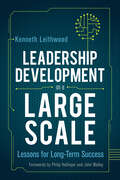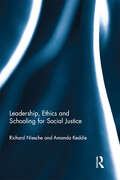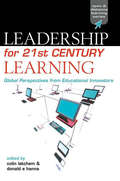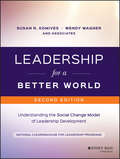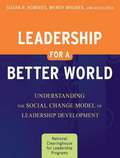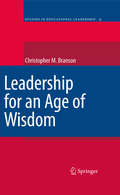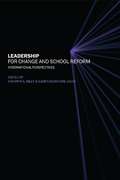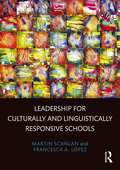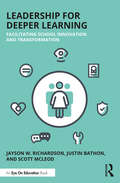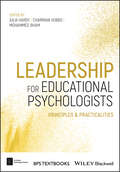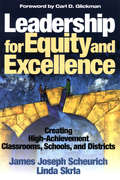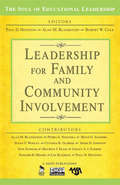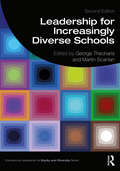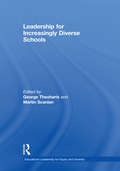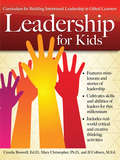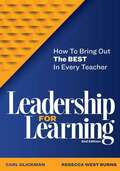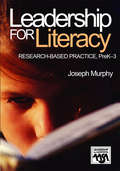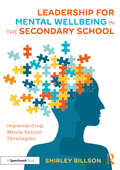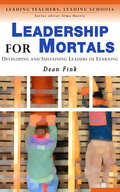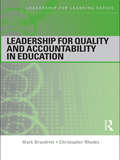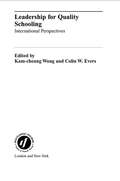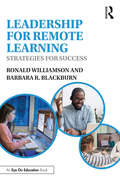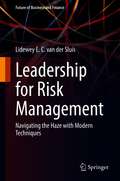- Table View
- List View
Leadership Development on a Large Scale: Lessons for Long-Term Success
by Kenneth LeithwoodIt considers how to make effective use of good evidence to build, refine and adapt leadership development initiatives so they contribute to growth in powerful forms of leadership and those conditions in schools that matter most to students.
Leadership Education 100: Traditions, Wellness, and Foundations of Citizenship
by The Editors at the PearsonThis book is the first component of Junior Reserve Officers Training Corps (JROTC) leadership education. It is intended for students who are entering the JROTC program and beginning their high school studies.
Leadership, Ethics and Schooling for Social Justice
by Richard Niesche Amanda KeddieIssues of social justice and equity in the field of educational leadership have become more salient in recent years. The unprecedented diversity, uncertainty and rapid social change of the contemporary global era are generating new and unfamiliar equity questions and challenges for schools and their leaders. In order to understand the moral and ethical complexity of work undertaken in the name of social justice and equity in diverse contexts, this book uses a range of different theoretical tools from the work of Michel Foucault. Rather than a prescriptive, best practice approach to leadership and social justice, this book draws on Foucault’s four-fold ethical framework, and specifically, the notions of advocacy, truth-telling and counter-conduct to critically examine the leadership work undertaken in case studies in schools in Australia and England. Our approach makes transparent the ethical work that leaders in these contexts conduct on themselves towards creating schools that can address the equity challenges of the present climate. It illuminates and enables critical analysis of the moral imperatives shaping the equity work of school leaders and, in particular, the possibilities for transformative leadership that can work to create schools and school systems that are more socially just. Overall, the book’s key aims are to: Provide an innovative and comprehensive theorising of leadership for social justice in contemporary times; Explicate the utility of key elements of Foucault’s theorising of the ethical self to the domain of educational leadership; and Provide significant practical insight into the social justice possibilities of school leadership in contemporary times through two in depth case studies
Leadership for 21st Century Learning: Global Perspectives from International Experts (Open and Flexible Learning Series)
by Colin Latchem Donald E HannaThe challenge of managing education effectively is formidable. Written by two education managers, this text explores the issues associated with good leadership in educational and training institutions. It is based on their own work and on a series of detailed interviews with eminent leaders.
Leadership for a Better World: Understanding the Social Change Model of Leadership Development
by Susan R. Komives Nclp Wendy WagnerThe essential guide to the theory and application of the Social Change Model Leadership for a Better World provides an approachable introduction to the Social Change Model of Leadership Development (SCM), giving students a real-world context through which to explore the seven C's of leadership for social change as well as a approaches to socially responsible leadership. From individual, group, and community values through the mechanisms of societal change itself, this book provides fundamental coverage of this increasingly vital topic. Action items, reflection, and discussion questions throughout encourage students to think about how these concepts apply in their own lives. The Facilitator's Guide includes a wealth of activities, assignments, discussions, and supplementary resources to enrich the learning experience whether in class or in the co-curriculum. This new second edition includes student self-assessment rubrics for each element of the model and new discussion on the critical roles of leadership self-efficacy, social perspective, and social justice perspectives. Content is enriched with research on how this approach to leadership is developed, and two new chapters situate the model in a broader understanding of leadership and in applications of the model. The Social Change Model is the most widely-used leadership model for college students, and has shaped college leadership curricula at schools throughout the U.S. and other countries including a translation in Chinese. This book provides a comprehensive exploration of the model, with a practical, relevant approach to real-world issues. Explore the many facets of social change and leadership Navigate group dynamics surrounding controversy, collaboration, and purpose Discover the meaning of citizenship and your commitment to the greater good Become an agent of change through one of the many routes to a common goal The SCM is backed by 15 years of research, and continues to be informed by ongoing investigation into the interventions and environments that create positive leadership development outcomes. Leadership for a Better World provides a thorough, well-rounded tour of the Social Change Model, with guidance on application to real-world issues.
Leadership for a Better World
by Susan R. Komives Wendy WagnerThe Social Change Model of Leadership Development particularly appeals to undergraduate students because it's an approach to leadership development that views leadership as a purposeful, collaborative, values-based process that uses multiple perspectives to enact positive social change. This accessible textbook engages the reader in understanding the nature of social change and the dimensions of leadership that help one become an effective change agent. It includes case studies, reflection questions, and learning activities to help facilitate engagement with the model. Written and edited by some of the country's most recognized and active scholars and educators in student leadership, the book has been field-tested by leadership faculty.
Leadership for an Age of Wisdom
by Chris BransonThis book provides a clear, comprehensive, and compelling description of the nature, characteristics, and prerequisites of wisdom-led leadership. It not only includes a detailed description of what is meant by wisdom-led leadership but also it describes how wisdom-led leadership can be developed based on current research data. In other words, practical ways to promote wisdom-led leadership are described. In addition, a metaphysical foundation in support of wisdom-led leadership is provided along with a detailed analysis of how this form of leadership can better prepare the leader to confidently and capably attend to their relational and organisational development demands, which are pivotal to their success. Finally, the fundamentally important and influential external issues of performance management, vision, goals, and accountability are discussed at length with respect to their potentially detrimental impact on the achievement of wisdom-led leadership. Embracing wisdom-led leadership does not mean that we have to forgo what performance management, vision, goals, and accountability procedures seek to achieve. It just means that these desired outcomes need to be achieved differently.
Leadership for Change and School Reform: International Perspectives (Educational Change And Development Ser.)
by Karen Seashore Louis Kathryn A. RileySchool reform is a top priority for governments today. This timely and challenging book, edited by leading international researchers, Kathryn Riley and Karen Seashore Louis, offers a rich comparative perspective on leadership for change and school reform. Contributors form North America, Europe and Australia demonstrate how school leadership is influenced by global pressures, differing national and state contexts and local concerns. They illustrate the limitations of reform initiatives which focus on school leaders tot he exclusion of the many other organisations which affect school, such as national and local governments, professional associations and school communities. This book raises some important questions such as:*How can school leaders create intelligent, thinking schools?*How can leadership and learning be linked together?*What are the characteristics of effective local education authorities and school districts?*What is the role of teacher organisations in educational reform and change?*What happens if businesses, teachers, parents and local communities have different views of what makes a good school?The text illustrates the ways in which leadership is rooted in learning, and identifies new directions for school leadership. It challenges conventional notions of leadership, offering an expanded view, which sees leadership just as an individual role-based function, but as a network of relationships among people, structures and cultures. This lively and provocative book should be read by all those interested in education reform.
Leadership for Culturally and Linguistically Responsive Schools
by Martin Scanlan Francesca A. LópezLeadership for Culturally and Linguistically Responsive Schools explores how schools can cultivate students’ linguistic and cultural proficiencies, provide students with a rich and challenging learning environment, and ensure that students are socioculturally integrated. Containing special features such as Storyboxes to detail specific cases of how school leaders put theory into practice, and integrated exercises to provide launching points for critical dialogue and help readers make connections to their own contexts, this book brings together research from the field of bilingual education and school improvement to provide a strong theoretical and research framework as well as best practices for supporting all students. Authors Scanlan and López provide aspiring and practicing leaders the guidance to lead, organize, and support their schools to effectively serve linguistically and culturally diverse students. A Companion Website includes exercises from the book available for download and modification and a blog focused on emerging research and effective practices.
Leadership for Deeper Learning: Facilitating School Innovation and Transformation
by Jayson W. Richardson Justin Bathon Scott McLeodThis exciting book explores how leaders have implemented, sustained, and pushed innovative, deeper learning opportunities in their school settings. Across the United States and around the world, the concept of a school is growing more action-oriented, performance-focused, digitally relevant, and democratically infused. In this book, you’ll hear from real schools and leaders about practices that are changing schools and leading to deeper learning experiences across seven categories of innovative practice—including vision, agency in learning, trust in teachers, openness to new ideas, over-communicating change, equity mindedness, and courage to live outside norms. Leadership for Deeper Learning looks at how school leaders change the status quo and create different learning environments for students and teachers. Rich in stories and strategies, this book will provide you with the ideas and tools to rethink and reignite learning for the future.
Leadership for Educational Psychologists: Principles and Practicalities (BPS Textbooks in Psychology #107)
by Julia Hardy Mohammed Bham Charmian HobbsWritten by and for educational psychologists, this valuable text includes reflections and practical support that will equip professionals to confidently handle the challenges inherent to leadership in the field for decades to come. The book: Meets a need to support new and existing educational psychologists (EPs) in understanding a range of leadership models Provides useful frameworks to apply to the Local Authority contexts where leaders are working Offers chapters that can be read independently as stand-alone topics or in sequential order Is derived from decades of courses for leaders of educational psychology Written by experienced educational psychologists (EPs) for other EPs in leadership positions and those aspiring to become leaders, this unique and practical book addresses a number of themes including the debate over the nature of leadership and the growing concern for equity and ethics in practice. It emphasises the importance of building and maintaining relationships at all levels, especially during challenging times. Leadership for Educational Psychologists: Principles & Practicalities offers chapters covering such topics as: managing educational psychology services (EPSs); past and present leadership frameworks; ethical leadership; change management; women in leadership; inspirational and outward-facing leadership; educational psychology within a Welsh context; appreciative enquiry; recruitment and retention; managing data and quality standards; selling educational psychology services; and more. The book finishes with a section on available support mechanisms for EPs in leadership positions. Leadership for Educational Psychologists will be of great benefit to educational psychologists in leadership, including existing principal and senior educational psychologists, as well as those planning to move into promoted posts within EPSs. It will also be of interest to policymakers in local government, public sector leaders who manage professionals within local authorities, and voluntary and community organisations.
Leadership for Equity and Excellence: Creating High-Achievement Classrooms, Schools, and Districts
by James Joseph Scheurich Linda E. SkrlaThis guide encourages school leaders and teachers to develop creative strategies for student equity and advancement using tools like accountability, equity audits, and proactive redundancy.
Leadership for Family and Community Involvement
by Paul D. Houston Alan M. Blankstein Robert W. ColeMaking schooling a community endeavor! Because schools are the heart and soul of a community, educational leaders have a responsibility to bring the community into the school, as well as to make the school a part of the surrounding community. With articles from leading authorities and practitioners, this volume examines how educators can build family and community partnerships for school success. Educational leaders will find: Contributions from Alan M. Blankstein, Pedro A. Noguera, Mavis G. Sanders, Paul D. Houston, and others Inspiring and unique perspectives on the interplay of family and community in school success Ideas for engaging families as partners
Leadership for Green Schools: Sustainability for Our Children, Our Communities, and Our Planet
by Lisa A. Kensler Cynthia L. UlineLeadership for Green Schools provides aspiring and practicing leaders with the tools they need to facilitate the design, leadership, and management of greener, more sustainable schools. Framed by theory and research, this text draws from the fields of sustainability science, built learning environment, and educational leadership to explain what green schools look like, what role school buildings play in advancing sustainable organizational and instructional practices, and why school leaders are "greening" their leadership. Sustainability can often seem like an unreachable, utopian set of goals, but this important resource uses illustrative examples of successful schools and leaders to show how establishing and managing green schools aligns with the work they are already doing to restore engaged learning within their schools and communities. Leadership for Green Schools is a unique and important resource to help leaders reduce the environmental impact of school buildings and immerse students in purposeful, meaningful learning for a sustainable, just future. Special Features: Examples from award-winning schools and leaders—best-practices and illustrative examples throughout make whole school sustainability come to life and show how green leadership is a real possibility for the reader. Aligned with Professional Standards for Educational Leadership—provides the tools necessary for leaders to advance sustainability goals while at the same time fulfilling the core purposes of their job. End-of-chapter discussion questions—valuable pedagogical tools invite personal reflection and conversation.
Leadership for Increasingly Diverse Schools (Educational Leadership for Equity and Diversity)
by George Theoharis and Martin ScanlanThe second edition of Leadership for Increasingly Diverse Schools helps both practicing and aspiring school leaders deepen their knowledge, skills, and dispositions to create schools that best serve all students. This book helps readers sharpen their awareness of how students’ multiple dimensions of diversity intersect, as well as develop strategies for working with students of all socioeconomic statuses, races, religions, sexual orientations, languages, and special needs. Leadership for Increasingly Diverse Schools provides school leaders with the theory, research, and practical guidance to foster teaching and learning environments that promote educational equity and excellence for all students. Special features: Each chapter focuses on a specific dimension of diversity and discusses intersectionality across other areas of difference, including ability/disability, linguistic diversity, race, socioeconomic status, sexual orientation, gender, religion, and social frontiers. Chapters synthesize literature, share practical strategies and tools, include school-level and district-level cases illustrating inclusive leadership, and provide extended learning opportunities. Online eResources features additional resources, documents, and links to specific tools described in the chapters, accessible at www.routledge.com/9780367404604.
Leadership for Increasingly Diverse Schools
by George Theoharis Martin ScanlanLeadership for Increasingly Diverse Schools provides both practicing and aspiring leaders with the theory, research, and practical guidance to lead socially just schools. Today’s schools are growing more pluralistic and diverse, and leadership is central to reversing long-standing trends of educational inequities, exclusion, and disparate school outcomes. This book helps readers sharpen their awareness of how multiple dimensions of diversity intersect as well as develop strategies for working with students of all socioeconomic statuses, races, religions, sexual orientations, languages, and special needs. Leadership for Increasingly Diverse Schools provides school leaders the tools to foster teaching and learning environments that promote educational equity and excellence for all students. Special Features: Each chapter focuses on a specific dimension of diversity and discusses intersectionality across other areas of difference, including ability/disability, linguistic diversity, race, socioeconomic status, sexual orientation, gender, religion, and social frontiers. Chapters synthesize literature, provide practical strategies and tools, and include school-level and district-level cases illustrating inclusive leadership. End-of-chapter resources point readers toward further discussion of conceptual elements, practice connections, and research applications. A companion website features modifiable downloads and further resources for each chapter.
Leadership for Kids: Curriculum for Building Intentional Leadership in Gifted Learners (Grades 3-6)
by Cecelia Boswell JJ Colburn Mary ChristopherGifted students may possess the seeds of gifted leadership or may be expected to lead because of their intellectual capacities. And, as with any potentiality, leadership ability should be developed. This book looks beyond current definitions and examples of leadership to offer a framework within which to cultivate skills and abilities of leaders for this millennium. The curriculum nurtures leadership potential in elementary gifted learners through mini-lessons and activities that are structured around the four leadership frames developed by Bolman and Deal, researchers in organizational leadership. Gifted leaders may or may not be born. But they definitely can be fostered.Grades 3-6
Leadership for Learning: How to Bring out the Best in Every Teacher
by Carl Glickman Rebecca West BurnsIn this revised edition, Carl Glickman and coauthor Rebecca West Burns synthesize their decades of experience in teacher education and supervision into a comprehensive guide to supporting teacher growth and student learning. Embedded in every page are the essential knowledge, skills, approaches, and methods that leaders need to drive instructional improvement. <p><p>Official school leaders and classroom teachers striving to be the best will learn how to put the school's goals and priorities into practice by <p>•Selecting the right structure for differentiating teacher professional learning to improve outcomes for students; <p>•Implementing the technical and procedural skills needed to support teacher learning while observing, assessing, and evaluating instruction; <p>•Identifying appropriate relational skills for communicating and working with teachers; <p>•Applying the best interpersonal approach to stretch each teacher based on their own developmental level; <p>•Making the most of teachable moments with immediate response skills; and <p>•Understanding how to support teachers' social-emotional wellness as an essential component of improving practice. <p><p>In addition, each chapter provides detailed scenarios and case studies that illustrate exceptional leadership, and the Appendixes offer connections to dozens of promising practices. <p><p>We are in a new era of teaching and learning, and a new kind of leader is needed to guide successful and extraordinary schools. Leadership for Learning: How to Bring Out the Best in Every Teacher gives preK–12 leaders the powerful tools they need to ensure that competent, caring, qualified professionals who want to improve teaching and learning are in every classroom.
Leadership for Literacy: Research-Based Practice, PreK-3
by Joseph F. MurphyThis groundbreaking text compiles 20 years of research to prove the link between effective literacy programs and the crucial role administrators play in developing successful literacy instruction.
Leadership for Mental Wellbeing in the Secondary School: Implementing Whole School Strategies
by Shirley BillsonLeadership for Mental Wellbeing in the Secondary School is an introduction to a set of simple shifts you can enact to make your work more rewarding, and your school a flagship of excellence. Full of practical tools and proven strategies this book draws on a combination of research and experience to empower you to make confident changes on your own terms that are suitable for you and the unique circumstances of your school. No matter what stage of your career, this book will help you: influence disenchanted and overloaded teaching staff to feel motivated and valued again (and improve the budgetary bottom line in the process) increase pupil confidence and resilience, preventing deeper mental health problems down the line practise bold leadership and deliver on what you really came into teaching for – preparing rounded, confident, individuals for life Emphasising whole-person and whole-school approaches, this book is for any school leader looking to transform how they, their staff and their students feel about and cope with the day-to-day challenges and demands placed upon them.
Leadership for Mortals: Developing and Sustaining Leaders of Learning (Leading Teachers, Leading Schools Series)
by Dean Fink'Overall, and as one has come to expect from Fink, this is a readable text that thinks outside the box of leadership theory... I have no doubt that the text will be welcomed by many readers for an engaging style that places human interest at the heart of the discourse in the field' - Mark Brundrett, writing in Educational Management Administration and Leadership 'It is a 'must read' for those in educational leadership roles in schools, both to gain invaluable insights and to draw on a framework for individual reflection' - Professor Brent Davies, University of Hull `I enjoyed reading this book. The combination of critical reflection of his experience in the light of relevant literature makes for a lively and thought-provoking book. I was going to say "little" book, because at times I would have liked to have read more. But on the other hand, it is the sort of book one - the academic and the leader - could read in one sitting, enjoy and come back to for some ideas. I recommend you to do so' - ESCalate `This book provides a refreshing alternative to the rhetoric about 'superheads', and 'mavericks' that has been prevalent in some of the recent discourse about leadership. Dean Fink draws heavily upon the work of Andy Hargreaves, Michael Fullan and his own research with Louise Stoll so some of the ideas are familiar. However, what makes Leadership for Mortals interesting is the way in which he untangles the complexities of leadership by using genuine examples alongside the theory. Dean Fink's writing is accessible and his anecdotal style should resonate with his intended audience of current and prospective leaders' - LDR, The Magazine for School Leaders `This book is a welcome antidote to the notion of school leaders as heroic figures. Dean Fink's commitment to enhancing the life chances of young people shines through the pages' - Kate Myers, Times Educational Supplement `With great wisdom and insight, Dean Fink invites us into his leadership stories to masterfully illustrate that school leadership is no longer a person but an intricate network of 'mortals' working together to enhance learning experiences for students. They are truly leaders of learning, where commitment to successful learning for all students is the locus of their passion, perseverance and persuasion. Balanced with connections to respected leadership literature, this lucid and eloquent book will inspire current and future school leaders to reflect and develop their leadership practice to higher levels of effectiveness. An outstanding and optimistic read for all school leadership mortals, practitioners and scholars alike. I enjoyed it immensely' - David Eddy, Director, First-time Principals Programme, The University of Auckland `Practitioners will find this book at the same time reassuring and challenging. Fink includes stories of leadership that highlight effective strategies and some approaches that have gone wrong. They are real and ring true and therefore credible and instructive' - Ken Thompson Principal, Gladstone Park Secondary College, Australia `A great story about schools and their leaders progressing towards a knowledge driven world and the roads they choose to travel. Building sustainable communities of practice and the credible and varied examples of how the combination of leadership behaviour and enabling and disabling processes can make or break a successful school are clearly illustrated in Leadership for Mortals. A significant read for all aspirant and accomplished leaders' - - Jenny Lewis,Executive Officer, Australian Council for Educational Leaders 'Dean Fink brings together a wealth of learning from his own experience as a leader and learner to provide some powerful messages. This is a well-informed book with a strong theoretical basis but it is also personal and real, making sense of educational leadership in a way that is both profound and down-to-earth. School leaders in the UK and elsewhere will find inspiration, reassurance and challenge in this book' - Steve Munby, Chief Executive, National College for School Leaders...
Leadership for Quality and Accountability in Education (Leadership for Learning Series)
by Mark Brundrett Christopher RhodesThe study of educational leadership makes little sense unless it is in relation to who the leaders are, how they are leading, what is being led and with what effect. Based on the premise that learning is at the heart of leadership and that leaders themselves should be learners, the Leadership for Learning series explores the connections between educational leadership, policy, curriculum, human resources, and accountability. Each book in the series approaches its subject matter through a three-fold structure of process, themes and impact. Series Editors - Clive Dimmock, Mark Brundrett and Les Bell What is the role of leadership in developing strategies that enhance learning outcomes? Leadership for Quality and Accountability in Education addresses the interconnected issues of quality and accountability in the education system and provides a coherent framework within which these issues can be analysed. The authors outline the significance of promoting quality in all educational establishments and go on to discuss why quality and accountability have become so essential to the framework of leadership in education, how quality and accountability have been utilised on a national and international scale and what the defining characteristics of these terms are. The book is divided into three sections which explore three linked key aspects: Part I focuses on the concept and nature of quality and accountability and the process of developing a culture of quality; Part II addresses the issues of managing staff and resources, leadership for high-quality teaching and learning and relationships with stakeholders; Part III considers the impact and prospect of quality and accountability, including internal evaluation and external inspection. The book will appeal to educational leaders and managers, advisors and inspectors, and academic researchers. It will also be of particular relevance to Masters and doctoral degree students specialising in school leadership and management.
Leadership for Quality Schooling: International Perspectives (Student Outcomes And The Reform Of Education Ser.)
by Colin W. Evers Kam-cheung WongLeadership for Quality Schooling provides the latest thinking and research on school leadership from a range of international scholars in the field of educational administration. Because of the growing acceptance of school- based models of school management, there is now developing a greater focus on how quality education can be more fully achieved in this increasingly commonplace administrative context. Since one major aspect of promoting quality is the role of school leadership, this book offers a particular focus on the question of the connection between leadership and school improvement, effectiveness and performance. Leadership for Quality Schooling will be of interest to educational practitioners, students, researchers, academics and policymakers. It is intended as a guide to the latest research on leadership, as well as a stimulus to further thought for those looking for alternative ideas to existing practices.
Leadership for Remote Learning: Strategies for Success
by Ronald Williamson Barbara R. BlackburnLearn how to adapt leadership and keep motivation alive in a remote learning setting or hybrid school. In this essential book, bestselling authors Ronald Williamson and Barbara R. Blackburn share frameworks and tools you can use to immediately make a difference in your school. You’ll learn how to do the following: Navigate the change process in remote learning Maintain a collaborative remote learning school Address equity issues in remote instruction Communicate effectively across online platforms Provide essential professional development remotely The chapter coverage ranges from school culture, to collaboration, to instructional leadership, to focusing on your own effective leadership. You will gain practical strategies and tips you can implement immediately to help your school and community flourish in a remote learning environment.
Leadership for Risk Management: Navigating the Haze with Modern Techniques (Future of Business and Finance)
by Lidewey E. van der SluisThe market is like the sea: it gives, and it takes away. That became apparent once again when the economy and society went into “lockdown” due to the coronavirus outbreak. Organizations will either sink or swim, and only the pros will be able to keep their heads above water.This is a self-help book for managers, supervisors and administrators who see themselves as skippers at the helm of an organization in times of turbulence, uncertainty and complexity. It provides a number of the latest handy management models, such as the Three-Phase Model, Governance Model and Management Matrix, which help leaders and managers arrive at well thought-out risk management decisions. In addition, the practical cases and discussion questions in each chapter help readers implement these models in their organizations. The book is an English translation of the Dutch book ‘Varen in de mist’, which was nominated for the Dutch Management Book of the Year.
